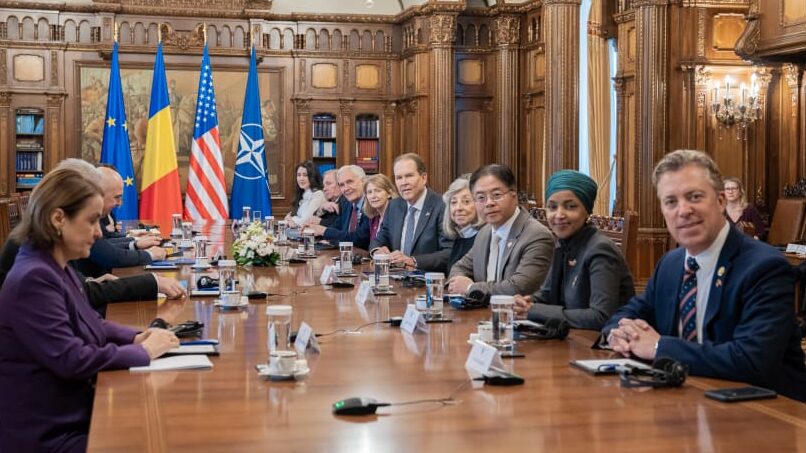
U.S. Congressional delegation led by Rep. Vern Buchanan (R-FL) met with members of the Romanian administration of acting President Ilie Bolojan.
Photo: Presidential Administration of Romania
A U.S. congressional delegation comprising eight representatives from both parties traveled to Bucharest, Romania, to seek clarification about last year’s canceled presidential election and address the recent setbacks about the country’s inclusion in the U.S. Visa Waiver program during meetings with government and parliamentary officials on Tuesday, April 15th.
The visit is seen as a major step toward mending the strained relationship between Washington and Bucharest following Vice President JD Vance’s remarks at the Munich Security Conference condemning the annulment of the 2024 presidential election due to the first-round victory of nationalist candidate Călin Georgescu.
Officially, the election results were annulled due to allegations of Russian interference boosting Georgescu’s TikTok campaign, but no clear evidence of the claims has ever been made public. The move was heavily criticized as “destroying democracy” by non-establishment parties on both sides of the political divide and led to a months-long series of massive protests involving hundreds of thousands of people.
The public unrest reached new heights last month when the Constitutional Court banned Georgescu from participating in the repeat elections in May. Simultaneously, the Trump administration announced the delay of Romania’s accession to the U.S. Visa Waiver program. While the official reason cited ongoing bureaucratic reviews, we also reported that the U.S. Embassy hinted at concerns over Romania’s democratic backsliding as a factor.
Tuesday’s meeting between the delegation led by Rep. Vern Buchanan (R-FL) and interim President Ilie Bolojan (PNL/EPP) reportedly went well. The congressmen promised to make the resumption of the country’s accession to the program a priority, and—at least according to Romanian media sources—found Bolojan’s explanation for the election annulment and commitment to transparency going in the May race “reassuring.”
The Romanian administration’s press release after the talks said:
Regarding the 2024 electoral process, [Bolojan] specified that Romania has learned the necessary lessons and that the state institutions are committed to ensuring the fair and transparent conduct of the elections, in full agreement with democratic standards.
However, there’s no indication whether these “lessons” are about the dangers of canceling democratic elections or safeguarding against foreign interference.
The parties also discussed the further development of the two countries’ strategic partnership, both militarily and economically, and the congressmen reassured Bucharest that the U.S. would not withdraw its troops from the country.
Currently, there are about 5,000 U.S. military personnel stationed at Romania’s four NATO bases. One of these, the Mihail Kogălniceanu Air Base (MKAB) is currently being expanded to become the largest NATO base in Europe and is planned to host up to 10,000 allied troops alone as a central element of NATO’s deterrence strategy against Russia.
